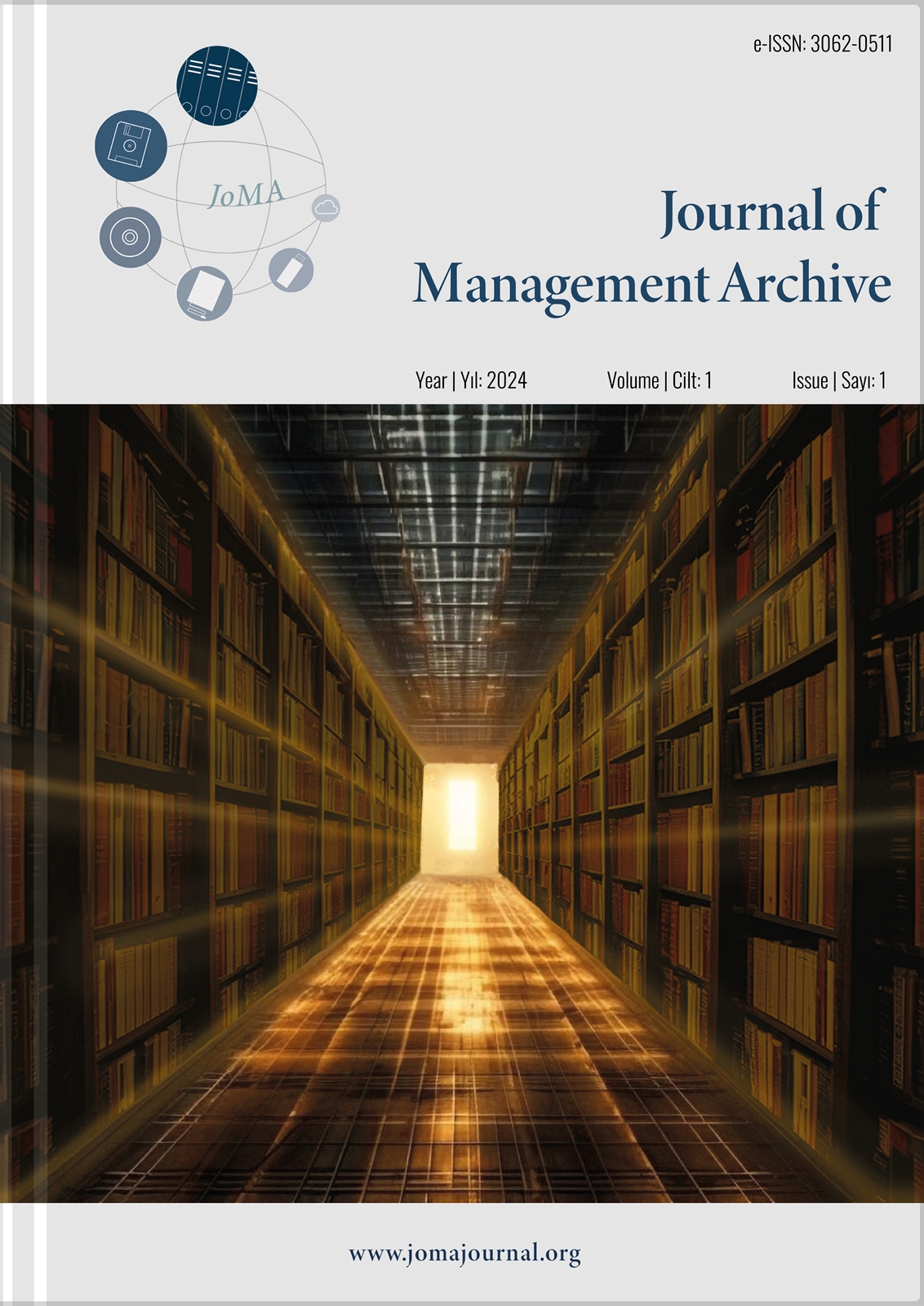Decision-making styles and career commitment: A research on sports manager candidates
Main Article Content
Abstract
Background. Nowadays, it is observed that with the increase in the number and quality of sporting events, the need for sports managers also increases. In this context, it can be stated that it is important to examine the decision-making styles and career commitment processes of sports managers, which are needed in sports management.
Aim. This research aims to examine the relationship between sports manager candidates’ decision-making styles and career commitment.
Method. The study group of the research consists of a total of 165 sports manager candidates, 81 women and 84 men, who are continuing their undergraduate education. Decision-making styles and career commitment scales were used to collect research data. The research included correlation and multiple regression analyses as well as descriptive statistics.
Findings. According to the correlation analysis findings of the research, while there was a positive and medium-level (r= .329) relationship between rational decision-making style and career commitment, a negative and low-level (r= -.174) correlation was found between avoidance decision-making style and career commitment. According to the findings of multiple regression analysis, it was determined that the rational decision-making style had a positive effect on career commitment (β = .368), while the avoidance decision-making style had a negative effect (β = -.292).
Conclusion. As a result, if sports manager candidates use a rational decision-making style, their career commitment may be positively affected, whereas if they use an avoidance decision-making style, their career commitment may be negatively affected.
Article Details

This work is licensed under a Creative Commons Attribution 4.0 International License.
- Abstract 838
- PDF (Türkçe) 360
References
Alkharabsheh, A., Ahmad, Z. A., & Kharabsheh, A. (2014). Characteristics of crisis and decision making styles: The mediating role of leadership styles. Procedia-social and Behavioral Sciences, 129, 282-288. https://doi.org/10.1016/j.sbspro.2014.03.678 DOI: https://doi.org/10.1016/j.sbspro.2014.03.678
Allwood, C. M., & Salo, I. (2012). Decision-making styles and stress. International Journal of Stress Management, 19(1), 34-47. https://doi.org/10.1037/a0027420 DOI: https://doi.org/10.1037/a0027420
Bahrami, S. (2017). Yöneticilerin karar verme becerileri ile liderlik stilleri arasındaki ilişki ve bir araştırma. [Yayımlanmamış yüksek lisans tezi]. Bahçeşehir Üniversitesi.
Bavolar, J., & Orosova, O. (2015). Decision-making styles and their associations with decision-making competencies and mental health. Judgment and Decision Making, 10(1), 115-122. DOI: https://doi.org/10.1017/S1930297500003223
Blustein, D. L., & Phillips, S. D. (1990). Relation between ego identity statuses and decision-making styles. Journal of Counseling Psychology, 37(2), 160-168. https://doi.org/10.1037/0022-0167.37.2.160 DOI: https://doi.org/10.1037//0022-0167.37.2.160
Boğazlıyan, E. E., Yalçın, S., & Avşaroğlu, S. (2023). Kariyer stresi ve kariyer adanmışlığı ilişkisinde bir yordayıcı olarak öğretmenlik mesleğine yönelik tutumun incelenmesi: Necmettin Erbakan Üniversitesi pedagojik formasyon öğrencileri örneği. MANAS Sosyal Araştırmalar Dergisi, 12(2), 613-620. https://doi.org/10.33206/mjss.1146653 DOI: https://doi.org/10.33206/mjss.1146653
Bozyiğit, E., & Biçer, T. (2024). Karar verme stilleri kariyer stresini etkiler mi? Pamukkale Üniversitesi Eğitim Fakültesi Dergisi, 61, 149-163. https://doi.org/10.9779/pauefd.1314265 DOI: https://doi.org/10.9779/pauefd.1314265
Coetzee, M., & De Villiers, M. (2010). Sources of job stress, work engagement and career orientations of employees in a South African financial institution. Southern African Business Review, 14(1), 27-58.
Çetin, M.Ç., & Kara, M. (2024). Sporda etkili karar verme ölçeği (SEKVÖ): Geçerlik ve güvenirlik çalışması. Gazi Beden Eğitimi ve Spor Bilimleri Dergisi, 29(1), 40-52. https://doi.org/10.53434/gbesbd.1377855 DOI: https://doi.org/10.53434/gbesbd.1377855
Daswati, D., Wirawan, H., Hattab, S., Salam, R., & Iskandar, A. S. (2022). The effect of psychological capital on performance through the role of career engagement: Evidence from Indonesian public organizations. Cogent Social Sciences, 8(1), 2012971 https://doi.org/10.1080/23311886.2021.2012971 DOI: https://doi.org/10.1080/23311886.2021.2012971
Dewberry, C., Juanchich, M., & Narendran, S. (2013). Decision-making competence in everyday life: The roles of general cognitive styles, decision-making styles and personality. Personality and Individual Differences, 55(7), 783-788. https://doi.org/10.1016/j.paid.2013.06.012 DOI: https://doi.org/10.1016/j.paid.2013.06.012
Dopson, L.R., Lee, P.C., Lee, M.J., & Lara, A. (2022). Perceived importance of career engagement initiatives in hospitality education. Journal of Hospitality & Tourism Education, 34(4), 291 - 299. https://doi.org/10.1080/10963758.2020.1868314 DOI: https://doi.org/10.1080/10963758.2020.1868314
Dostanić, J., Suvajdžić, K. & Bojanić, Ž. (2021). Decision‐making styles, career decision self‐efficacy, and career adaptability among high school students. The Career Development Quarterly. 69(1). 63-77. https://doi.org/10.1002/cdq.12249 DOI: https://doi.org/10.1002/cdq.12249
Durbin, J. & Watson, G.S. (1971), Testing for serial correlation in least squares regression. III. Biometrika, 58(1), 1-19. DOI: https://doi.org/10.1093/biomet/58.1.1
Ertekin, A. B. (2021). Kariyer adanmışlığı ile yaşam doyumu arasındaki ilişki: Üniversite öğrencileri üzerine bir araştırma. Beden Eğitimi ve Spor Bilimleri Dergisi, 23(3), 128-141.
George, D., & Mallery, M. (2010). SPSS for Windows step by step: A simple guide and reference. Pearson
Geisler M. & Allwood C. M. (2017). Relating decision-making styles to social orientation and time approach. Journal of Behavioral Decision Making, 31(3), 415-429. https://doi.org/10.1002/bdm.2066 DOI: https://doi.org/10.1002/bdm.2066
Gürbüz, S. & Şahin, F. (2017). Sosyal bilimlerde araştırma yöntemleri. Seçkin Yayıncılık.
Hirschi, A. & Freund, P. A. (2014). Career engagement: Investigating intraindividual predictors of weekly fluctuations in proactive career behaviors. The Career Development Quarterly, 62(1), 5-20. http://dx.doi.org/10.1002/j.2161-0045.2014.00066.x DOI: https://doi.org/10.1002/j.2161-0045.2014.00066.x
Hirschi, A., Freund, P.A., & Herrmann, A. (2014). The career engagement scale: Development and validation of a measure of proactive career behaviors. Journal of Career Assessment, 22(4), 575-594. https://doi.org/10.1177/1069072713514813 DOI: https://doi.org/10.1177/1069072713514813
Hosen, S., Hamzah, S. R., Arif Ismail, I., NoormiAlias, S., Faiq Abd Aziz, M., & Rahman, M. M. (2023). Training & and development, career development, and organizational commitment as the predictor of work performance. Heliyon, e23903. https://doi.org/10.1016/j.heliyon.2023.e23903 DOI: https://doi.org/10.1016/j.heliyon.2023.e23903
Hunt, R. G., Krzystofiak, F. J., Meindl, J. R., & Yousry, A. M. (1989). Cognitive style and decision making. Organizational Behavior and Human Decision Processes, 44(3), 436-453. https://doi:10.1016/0749-5978(89)90018-6 DOI: https://doi.org/10.1016/0749-5978(89)90018-6
Jones, D. F., Brooks, D. D., & Mak, J. Y. (2008). Examining sport management programs in the United States. Sport Management Review, 11(1), 77-91. https://doi.org/10.1016/S1441-3523(08)70104-9 DOI: https://doi.org/10.1016/S1441-3523(08)70104-9
Jones, G. C., & Cunningham, G. B. (2008). The impact of sport management students’ perceptions of study abroad programs on their intentions to study abroad. Sport Management Review, 11(2), 149–163. https://doi.org/10.1016/s1441-3523(08)70107-4 DOI: https://doi.org/10.1016/S1441-3523(08)70107-4
Kalafat T. (2019). Algılanan kariyer engelleri (AKE) ölçeğinin Türk kültürüne uyarlama çalışması. Kariyer Psikolojik Danışmanlığı Dergisi, 2(2), 103-124.
Kalaycı, Ş. (2018). SPSS uygulamalı çok değişkenli istatistik teknikleri. (8. baskı). Dinamik.
Karasar, N. (2019). Bilimsel araştırma yöntemi. (34. baskı). Nobel.
Kim, B., Jang, S. H., Jung, S. H., Lee, B. H., Puig, A. ve Lee, S. M. (2014). A moderated mediation model of planned happenstance skills, career engagement, career decision self-efficacy, and career decision certainty. The Career Development Quarterly, 62(1), 56-69. https://doi.org/0.1002/j.2161-0045.2014.00070.x DOI: https://doi.org/10.1002/j.2161-0045.2014.00070.x
Korkmaz, O., Kırdök, O., Alkal, A., & Akça, M.Ş. (2020). Kariyer adanmışlık ölçeği: Proaktif kariyer davranışlarının ölçümünün geçerlik ve güvenirlik çalışması. International Social Sciences Studies Journal, 6(72), 4668-4677. https://doi.org/10.26449/sssj.2570 DOI: https://doi.org/10.26449/sssj.2570
Mathner, R. P., & Martin, C.L. (2012). Sport management graduate and undergraduate students’ perceptions of career expectations in sport management. Sport Management Education Journal, 6(1), 21-31. https://doi.org/10.1123/smej.6.1.21 DOI: https://doi.org/10.1123/smej.6.1.21
Niles, S. G., Erford, B. T., Hunt, B., & Watts, R. H. Jr., (1997). Decision-making styles and career development in college students. Journal of College Student Development, 38, 479-488
O’Brien, R. M. (2007). A caution regarding rules of thumb for variance ınflation factors. Quality & Quantity, 41(5), 673-690. DOI: https://doi.org/10.1007/s11135-006-9018-6
Olcum, D., & Titrek, O. (2015). The effect of school administrators’ decision-making styles on teacher job satisfaction. Procedia-Social and Behavioral Sciences, 197, 1936-1946. https://doi.org/10.1016/j.sbspro.2015.07.575 DOI: https://doi.org/10.1016/j.sbspro.2015.07.575
Özsarı, A. (2024). Kamu spor örgütlerinde insan kaynakları yönetim uygulamaları ve yenilikçi davranış ilişkisi. Spormetre Beden Eğitimi ve Spor Bilimleri Dergisi, 22(1), 14-26. https://doi.org/10.33689/spormetre.1334808 DOI: https://doi.org/10.33689/spormetre.1334808
Phillips, S. D., Pazienza, N. J., & Ferrin, H. H. (1984). Decision-making styles and problem-solving appraisal. Journal of Counseling Psychology, 31(4), 497-502. https://doi.org/10.1037/0022-0167.31.4.497 DOI: https://doi.org/10.1037//0022-0167.31.4.497
Retar, I., Plevnik, M., & Kolar, E. (2013). Key competences of Slovenian sport managers. Annales Kinesiologiae, 4(2), 81-94.
Riaz, M. N., Riaz, M. A., & Batool, N. (2012). Personality types as predictors of decision making styles. Journal of Behavioural Sciences, 22(2), 99-114.
Scott, S.G. & Bruce, R.A. (1995). Decision-making style: The development and assessment of a new measure. Educational and Psychological Measurement, 55(5), 818-831. https://doi.org/10.1177/0013164495055005017 DOI: https://doi.org/10.1177/0013164495055005017
Silva, A. F., Conte, D. & Clemente F. M. (2020). Decision-making in youth team-sports players: a systematic review. İnternational Journal of Environmental Research and Public Health, 17(11), 3803. https://doi.org/10.3390/ijerph17113803 DOI: https://doi.org/10.3390/ijerph17113803
Siyahtaş, A., Çavuşoğlu, S. B., & Kantar, A. N. (2023). Spor gönüllülerinin motivasyonları ile kariyer gelecekleri ve adanmışlıkları arasındaki ilişkinin incelenmesi. Beden Eğitimi ve Spor Araştırmaları Dergisi, 15(1), 49-63. https://doi.org/10.55929/besad.1243177 DOI: https://doi.org/10.55929/besad.1243177
Sou, E. K. L., Yuen, M. & Chen, G. (2022). Career adaptability as a mediator between social capital and career engagement. The Career Development Quarterly, 70(1). 2-15. https://doi.org/10.1002/cdq.12289 DOI: https://doi.org/10.1002/cdq.12289
Şahin. C. (2011). Sosyal ve entellektüel sermayenin ilköğretim ile ortaöğretim okullarında kullanılma düzeylerinin okul yöneticilerinin görüşleri doğrultusunda incelenmesi [Yayımlanmamış doktora tezi]. Atatürk Üniversitesi.
Tabachnick, B.G., & Fidell, L.S. (2015). Çok değişkenli istatistiklerin kullanımı (Çev: Mustafa Baloğlu). Nobel Akademik Yayıncılık.
Taherdoost, H., & Madanchian, M. (2023). Multi-criteria decision making (MCDM) methods and concepts. Encyclopedia, 3(1), 77-87. https://doi.org/103390/encyclopedia301006 DOI: https://doi.org/10.3390/encyclopedia3010006
Taşdelen, A. (2001). Öğretmen adaylarının bazı psiko-sosyal değişkenlere göre karar verme stilleri. Pamukkale Üniversitesi Eğitim Fakültesi Dergisi, 10(10), 40-52.
Taşdelen, A. (2002). Öğretmen adaylarının farklı psiko sosyal değişkenlere göre karar verme stilleri [Yayımlanmamış doktora tezi]. Dokuz Eylül Üniversitesi.
Tunç, E., & Tunç, M. F. (2022). Rehber öğretmenler ile psikolojik danışman adaylarının kariyer adanmışlıkları ve kariyer kararı pişmanlıkları. Kariyer Psikolojik Danışmanlığı Dergisi, 5(2), 34-50. https://doi.org/10.58501/kpdd.1108991 DOI: https://doi.org/10.58501/kpdd.1108991
Upadyaya, K., & Salmela-Aro, K. (2015). Development of early vocational behavior: Parallel associations between career engagement and satisfaction. Journal of Vocational Behavior, 90, 66- 74. https://doi.org/10.1016/j.jvb.2015.07.008 DOI: https://doi.org/10.1016/j.jvb.2015.07.008
Uzonwanne, F. (2016). Rational model of decision making. In A. Farazmand (Ed.), Global Encyclopedia of Public Administration, Public Policy, and Governance. Springer International Publishing, AG. https://doi.org/10.1007/978-3-319-31816-5_2474-1 DOI: https://doi.org/10.1007/978-3-319-31816-5_2474-1
Ülgen, B., Sağlam, M., & Tuğsal, T. (2016). Managers’ personality traits over management styles and decision-making styles. International Journal of Commerce and Finance, 2(1), 125-136.
Yang, Y., Hatanaka, K., Takahashi, K., & Shimizu, Y. (2023). Relationship among the nursing practice environment, occupational career, and work engagement of Chinese nurses employed in Japan: A cross-sectional study. International Journal of Nursing Studies Advances, 5(3), 100166. https://doi.org/10.1016/j.ijnsa.2023.100166 DOI: https://doi.org/10.1016/j.ijnsa.2023.100166
Yayla, A., & Bacanlı, F. (2011). İlköğretim 8. sınıf öğrencilerinin kariyer gelişimleri ile karar verme stilleri arasındaki ilişkilerin incelenmesi. İlköğretim Online, 10(3), 1148-1159.
Yener, H. (2020). Effects of decision making styles on entrepreneurship skills. Technium Social Sciences Journal. 8. 569-578. https://doi.org/10.47577/tssj.v8i1.693 DOI: https://doi.org/10.47577/tssj.v8i1.693
Zikic, J., & Klehe, U.C. (2006). Job loss as a blessing in disguise: The role of career exploration and career planning in predicting reemployment quality. Journal of Vocational Behavior, 69(3), 391-409. https://doi.org/10.1016/j.jvb.2006.05.007 DOI: https://doi.org/10.1016/j.jvb.2006.05.007

